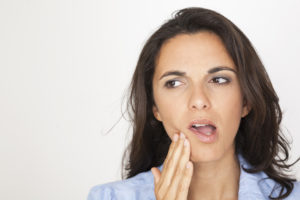Toothaches are perhaps the most widely-experienced form of dental discomfort, and they can indicate a number of different issues (some of which require immediate attention). Tooth discomfort can also be severely debilitating, and many adults admit to taking time off of work because of a toothache.
Because sensitivity is a symptom rather than a condition itself, finding relief requires treating the condition that’s causing your tooth to ache. Today, we explain some of the possible reasons behind your toothache, as well as a couple of less-common causes for tooth sensitivity.
Sign of Dental Trouble
- If you’ve ever had a toothache, there’s a good chance that it was caused by a cavity, which is a result of tooth decay eating away at your tooth’s structure. As a progressive disease, tooth decay affects the permanent teeth of over 90% of adults, and when allowed to progress, the cavities (small holes) that form expose your tooth’s sensitive nerves and blood vessels.
- Gum disease can also cause one or more of your teeth to hurt when your gums recede and uncover your teeth’s roots, leaving them vulnerable to hot and cold temperatures, food debris, bacteria, and other irritants. Left untreated, the infection can damage enough of your gum tissue and underlying jawbone to cause tooth loss.
- Aside from poor oral hygiene, your teeth can weaken from excessive wear, often as a result of habitual teeth-grinding or an uneven bite (crooked teeth). If enamel is worn away, or your tooth is cracked or fractured, then its interior can be exposed and lead to tooth sensitivity.
Less Common Toothache Causes
- Interestingly, not every toothache originates within your mouth. For instance, a sinus infection causes the soft tissue lining your sinuses to swell and produce excessive amounts of mucus. Your maxillary sinuses are the largest, and are located in your cheekbones close to the roots of your upper teeth. When inflamed, the tissue of these sinuses can swell and press against the teeth roots, leading to toothaches.
- Barodontalgia describes a condition where your teeth are sensitive because of altitude changes. When your ears pop, such as on an airplane or rollercoaster ride, the sensation stems from the air pressure inside your body adjusting to match the new pressure outside your body. The same phenomenon can occur in or around your teeth, which are inflexible and can’t accommodate the buildup.


